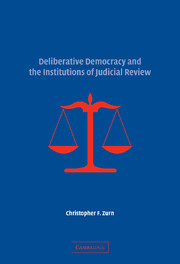
Deliberative Democracy and the Institutions of Judicial Review
$135.00 (C)
- Author: Christopher F. Zurn, University of Kentucky
- Date Published: March 2007
- availability: Available
- format: Hardback
- isbn: 9780521867344
$
135.00
(C)
Hardback
Other available formats:
Paperback, eBook
Looking for an examination copy?
This title is not currently available for examination. However, if you are interested in the title for your course we can consider offering an examination copy. To register your interest please contact [email protected] providing details of the course you are teaching.
-
In this book, Christopher F. Zurn shows why a normative theory of deliberative democratic constitutionalism yields the best understanding of the legitimacy of constitutional review. He further argues that this function should be institutionalized in a complex, multi-location structure including not only independent constitutional courts but also legislative and executive self-review that would enable interbranch constitutional dialogue and constitutional amendment through deliberative civic constitutional forums. Drawing on sustained critical analyses of diverse pluralist and deliberative democratic arguments concerning the legitimacy of judicial review, Zurn concludes that constitutional review is necessary to ensure the procedural requirements for legitimate democratic self-rule through deliberative cooperation. Claiming that pure normative theory is not sufficient to settle issues of institutional design, Zurn draws on empirical and comparative research to propose reformed institutions of constitutional review that encourage the development of fundamental law as an ongoing project of democratic deliberation and decision.
Read more- Thorough survey of different accounts of judicial review put forward by deliberative democratic theorists
- Proposes innovative institutional reforms for the system of constitutional elaboration in constitutional democracies
- Integrates research from political philosophy, jurisprudence, comparative political science of institutions, and legal studies
Reviews & endorsements
"Zurn is at his best and most interesting when engaged in exegetical analysis of the thought of others who have written on judicial review. Their work is treated fairly, engaged sympathetically, and analyzed perceptively." - James A. Gardner, University at Buffalo Law School, The Law and Politics Book Review
See more reviews"This book is imaginatively conceived, well written and researched, and tightly argued." - Christian Barry, Australian National University, Ethics
Customer reviews
Not yet reviewed
Be the first to review
Review was not posted due to profanity
×Product details
- Date Published: March 2007
- format: Hardback
- isbn: 9780521867344
- length: 376 pages
- dimensions: 233 x 162 x 29 mm
- weight: 0.72kg
- availability: Available
Table of Contents
Part I. Introduction:
1. An old chestnut is actually two
2. Pathologies of ad hoc triangulation
3. Functions and institutions
Part II. Majoritarian Democracy and Minoritarian Constitutionalism:
4. Judicial review as substantially legitimate protection of minority rights
5. Judicial review as procedurally legitimate protection of democracy
6. Moving beyond aggregative majoritarianism and minoritarian constitutionalism
Part III. From Majoritarian to Deliberative Theories of Constitutional Democracy:
7. Deliberative democracy: four axes of analysis
8. Constitutionalism: four central elements
9. Constitutional democracy?
Part IV. Deliberative Democracy and Substantive Constitutionalism:
10. Keepers of the substantive flame of American exceptionalism
11. Guardians of the moral law in the forum of principle
12. Are substantialist defenses of judicial review self-defeating?
Part V. Disagreement and the Constitution of Democracy:
13. Democratic precommitment to judicial review: Freeman
14. Deliberative majoritarianism and the paternalism of judicial review: Waldron
15. Upshot: we need a theory of democratic constitutionalism
Part VI. The Seducements of Juristic Discourse as Democratic Deliberation:
16. A division of labor between juristic deliberation and populist aggregation?
17. Actual juristic discourse in the United States system of constitutional adjudication
18. Legal principles and moral-political reasoning
Part VII. Constitutionalism as the Procedural Structuring of Deliberative Democracy:
19. A provisional summary: criteria for an adequate theory of constitutional review
20. Guardians of the conditions of procedural legitimacy: Habermas
Part VIII. The Institutions of Constitutional Review I: Design Problems and Judicial Review:
21. The problems of designing institutions of constitutional review
22. Independent constitutional courts in a concentrated review system
Part IX. The Institutions of Constitutional Review II: Horizontal Dispersal and Vertical Empowerment:
23. Self-review panels in the legislature and regulatory agencies
24. Mechanisms for inter-branch debate and decisional dispersal
25. Easing formal amendability requirements
26. Establishing civic constitutional fora.
Sorry, this resource is locked
Please register or sign in to request access. If you are having problems accessing these resources please email [email protected]
Register Sign in» Proceed
You are now leaving the Cambridge University Press website. Your eBook purchase and download will be completed by our partner www.ebooks.com. Please see the permission section of the www.ebooks.com catalogue page for details of the print & copy limits on our eBooks.
Continue ×Are you sure you want to delete your account?
This cannot be undone.
Thank you for your feedback which will help us improve our service.
If you requested a response, we will make sure to get back to you shortly.
×


